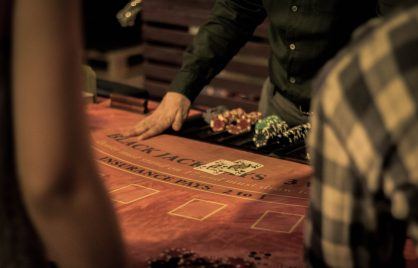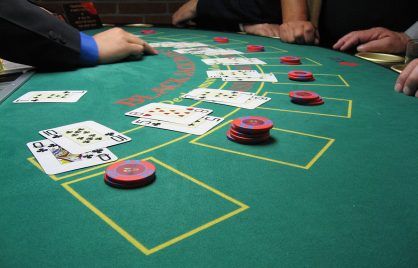How To Reduce Your Variance in Poker and Enjoy Bigger Winnings

Poker variance – also known as poker downswings – is essentially a period bad luck. It’s the difference between how much you expect to win based on your win rate over the long run, and the short term results.
Even if you are a solid winner, and you should be averaging a $2,000 profit per month, you can easily end up in red due to the variance in the short-term. Every player will go through these phases.
Downswings are a part of the game and are inevitable. But the good news is that you can actually reduce your variance, by increasing your edge in the games.
“The bigger win rate you have, the shorter swings you will encounter, as simple as that.”
Of course, an obvious way to achieve bigger win rates is to study strategy and improve your game, but we will not get into that today. Instead, we will cover a few additional ways to increase your edge.
In reality, your goal is to play at your best as long as you possibly can. Whenever you deviate from your A-game, you start leaving money at the table and increase your variance at the same time, which is something you want to avoid.
Here are some top tips for increasing your reducing your variance in poker.
1. Choose Your Games Wisely: Play When You’re The Best Player
If you find yourself on a 9max table with eight good players, you’re unlikely to win. However, if you’re up against a line-up of passive recreational opponents, you are likely to crush such games and win a ton of cash.
“The difference in your win rate in good and average games can be astonishing.”
Therefore, without changing your skill, finding better games is the easiest way to improve your win rate.
If you want to make more money, you have to play with worse players than you. When your opponents are better or equally skilled, you will not be making much, if any, profit in the long run. So leave your ego aside, and concentrate on maximizing returns.
Even if you are not an extremely good player, you can still make a lot of money if you find good tables, casinos, or private games full of recreational opponents. This is why some celebrities can consistently win in poker, even without being top-notch players – they simply play in private games.
On top of that, there is always a limited number of tables you can play both live and at online poker sites.
“If you choose to play one game, it means you choose not to play another one.“
This statement changed how I see things.
If you play on an OK table, it means you are not using this time to play on a great one. So if you have 2bb/100 hands on an average game, you are maybe leaving 15bb/100 on a great table that you can easily join.
Of course, this is a theoretical example, but it perfectly illustrates the point.
It is also true different casinos, online poker rooms, and even tournaments. You always have a choice where and what to play, so make sure to use it to your advantage.
How do you judge where the good games are? I am glad you asked.
- There is no better option than observing the action or knowing who the weak players in your games are.
The more you play, the easier it is to notice these things. If you play online, many sites let you mark players with different colors or leave notes on them, so you can easily identify weak players next time you are ready to play. Also, online platforms let you filter tables by players per flop, average pot, and other metrics that can help you find the best games. - Observe how many players see the flop.
If you see players limping or constantly sticking to raises to see the flop, it means they have poor pre-flop hands selection and are good opponents to have on your tables. - You can’t select tables in tournaments, but you can select where you play.
For example, if you have a high roller event in one casino, it’s quite obvious that the best players will be there. So instead of visiting the same casino to play, you can choose another venue and enjoy weaker fields.
2. Prepare For Your Games & Be The Best Version of Yourself
One of the most important things to help you control your emotions and play at your best is preparation.
I know this topic may sound a bit broad but it’s so crucial that I can’t skip it. I would divide it into four parts:
A Healthy Lifestyle
Even though many players may not want to acknowledge how important it is, you shouldn’t skip on exercising, healthy food, and an active lifestyle if you want to perform at your best. Moreover, it helps in all areas of your life, so that should be an easy choice.

Getting Enough Quality Rest
Getting a proper night’s sleep might be much more important than you think. You could be playing on a completely different level when you are fully rested, compared to you feeling fatigued and not being able to concentrate.
Generally, a good night’s sleep with at least five cycles of 90 minutes should do the job, but you can make it even better for yourself if you build a habit to sleep in a dark and cool room. Most importantly, try to build a sleeping routine in which you go to bed and wake up at the same time every day. It can make all the difference in the world.
On top of that, you shouldn’t start your session when physically tired. It will stand in the way of making educated decisions and you won’t be able to concentrate on what really matters.
Then Comes The Environment
If you want to perform at your best, you need to make sure to remove all the distractions that can bother you when playing.
If you’re playing at home, turn off the TV, mute your phone, close all browser windows and concentrate on the game.
But even in a live environment, you can control the big part of those distractions, so make sure to do your best to reduce it.
Warm Up Before The Game
There are many different ways to do it, but the most important part is to avoid jumping straight into playing immediately after waking up.
The best way to counter it is to have some kind of routine and stick to the same process.
So, before starting your games, make sure to warm up your brain by analyzing a couple of hands, reviewing your last session, or reading a strategy article.
This will help you start the session in a much better mind frame and make better decisions from the get-go.
3. Learn When to Quit
“Everyone knows that it is a bad idea to start playing when feeling bad, but it is equally as harmful to continue your session if you reach such a state.“
This also boils down to playing your A-game.
If you’re having a day when you can’t concentrate or make good decisions, there’s not much point in playing at all.
Quitting your session on time also plays a significant part in a successful strategy.
It is worth mentioning that you can’t always control it, though. If you play a tournament, you can’t stand up and leave.
However, cash games players have an additional weapon. They can stand up and leave the game no matter what, so learning when to use this option is very important.
The only time you need to reduce your planned session time is when you’re unable to concentrate on the game and play at your best.
If you get distracted or feel tired, take a break and return when you’re back on good form.
However, many players use a different strategy and have a stop/loss limit in their games — something I highly recommend avoiding for all of my students.
Have you ever thought why many players follow this strategy? I can’t find any reasonable answers to this question, but let me explain why I think this is such a bad idea.
First of all, games are getting tougher and tougher, which leads to lower win rates and bigger swings. If you stop playing every time you lose a couple of buy-ins, you may not find enough time to play. Contrary to this, quitting whenever you start running well is also not a great option.
If you quit your session every time in such situations, you’ll leave money at the table and waste a lot of valuable time that you could have used for playing.
If you can keep your concentration and make good decisions, it doesn’t matter whether you won or lost a couple of buy-ins. When you think about the long run, it makes no difference if you play your next hand today or tomorrow. So your previous results should not be the deciding factor of your playing time.
Of course, if you start tilting or playing poorly after you start your session with a bad run, you should take a break. However, you have to understand that this is not because of the swing, it’s because you started playing poorly – and that is a big difference.
So before making a sub-optimal decision and quitting your session when you can easily continue to play, think about what matters most.
The best way to avoid such a situation is to learn to think about every single hand as a separate event. Your past hands should not influence your decisions at the table, yet many players fall for this and try to find some justification for a poor play.
“Your only goal in the hand is to make the best possible decision in that particular situation, nothing else matters.”
If you do that, you will not need to worry about swings or set a stop/loss limit and will be able to play better and longer sessions, which will lead to better results.
These simple tips will help you play more hands and reduce the swings on the way. If you find the best games, prepare, and keep playing as long as you can, you will boost your win rate and reduce the variance – as simple as that.
Now you’re armed with tips on how to reduce variance in poker, head to our list of the best online poker sites to play today!

About The Author:
Tadas Peckaitis is a professional poker player, published author and poker coach. He writes for a range of online publications and helps other poker players to excel. He can be followed on Twitter and Facebook.


